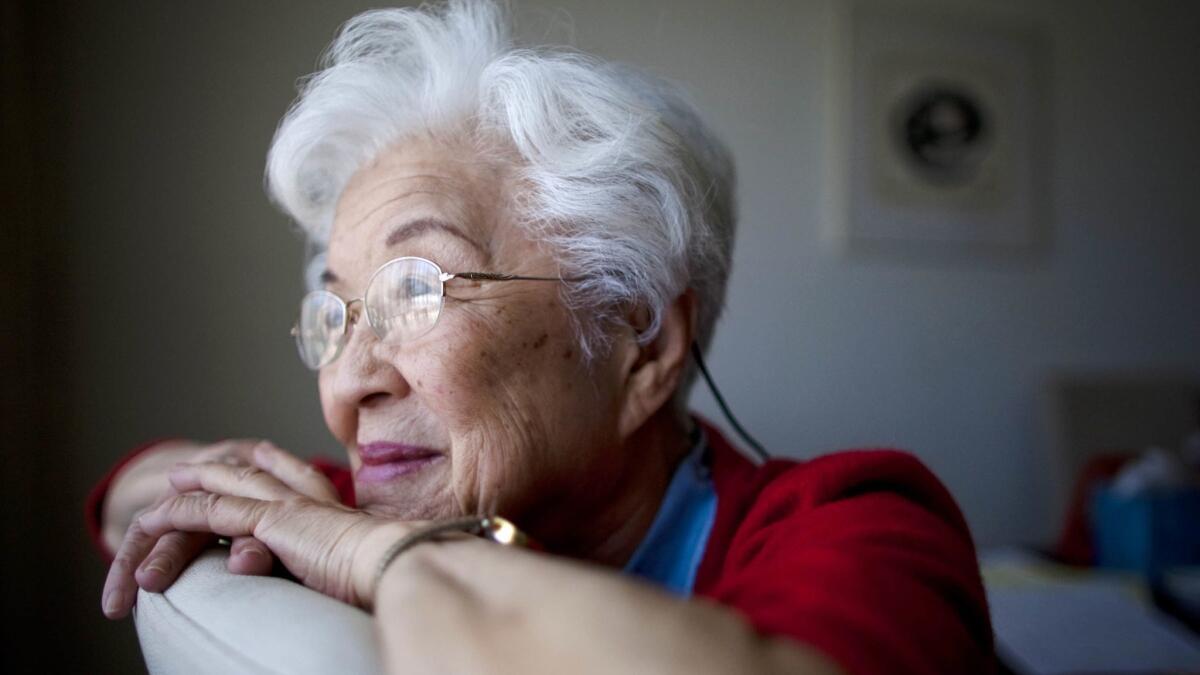Aiko Herzig-Yoshinaga, researcher and activist in fight for reparations for Japanese Americans, dies at 93

- Share via
She was a 17-year-old who loved the beach and was looking forward to the prom when the principal at Los Angeles High School gave her the shocking news.
Aiko Herzig-Yoshinaga would always remember what the man said in explaining why, just two months from graduation, she and other Japanese American students would not receive their diplomas.
“ ‘Because your people bombed Pearl Harbor,’ ” she quoted the principal as saying after the attack in 1941. “He put the responsibility for Pearl Harbor on our shoulders.”
She was soon forced out of school and into an internment camp.
Herzig-Yoshinaga, an activist and researcher who would go on to uncover key documents that proved the U.S. government had racist motives for incarcerating Japanese Americans during World War II, died Wednesday in Torrance. She was 93.
She died following a brief illness, said her son, David Abe.
Herzig-Yoshinaga’s discovery of the records, described by experts as a “bombshell” finding, played a major role in a landmark law that provided reparation payments to internees and a formal apology by President Reagan in 1988.
Her work also served as critical evidence in throwing out the convictions of three men who defied confinement orders and curfew laws targeting Japanese Americans.
Herzig-Yoshinaga was a researcher for the Commission on Wartime Relocation and Internment of Citizens, a group created by Congress in 1980 to study the relocation orders of World War II.
She’d become a master at navigating the National Archives in Washington, D.C., after spending much of her personal time there in her 50s, galvanized by the social movements of the 1960s and ’70s and driven by a sense of injustice over her incarceration decades earlier.
One day in 1982, she found a red, bound volume containing a draft report by Lt. Gen. John L. DeWitt that detailed an official rationale for sending Japanese Americans to internment camps.
The government had long claimed that the internment of 120,000 people of Japanese descent on the West Coast was done out of military necessity because there was little time to determine their individual loyalties.
But DeWitt’s draft report said the reason for the relocations was “not that there was insufficient time,” but that Japanese cultural traits made it “impossible to separate the sheep from the goats” and distinguish who could be trusted.
“We were astounded,” said Peter Irons, a retired professor of political science at UC San Diego who was working alongside Herzig-Yoshinaga at the time.
“We hadn’t the faintest idea that it existed, or that the changes made to it were designed to conceal the racist reasons” for the internments, Irons said. He added that the draft report was instrumental in his efforts to overturn the convictions of Japanese Americans who defied the curfew and relocation orders.
The document Herzig-Yoshinaga found was a record that the government hoped no one would ever discover, Irons said. All such copies were believed to have been burned. The discovery contributed to the commission’s finding that interment was driven by “race prejudice, war hysteria and the failure of political leadership.”
The research led to the passage of the Civil Liberties Act of 1988, which provided each surviving internee $20,000 and an official apology.
Born in 1924 in Sacramento to Japanese immigrants, Herzig-Yoshinaga was raised in Los Angeles and hoped to attend secretarial school after graduating from high school.
When relocation orders came in 1942, she eloped with her boyfriend and the two were shipped to the Manzanar internment camp in the eastern Sierra, far from her mother, father and siblings, who were sent to other camps.
Herzig-Yoshinaga gave birth to a baby girl at Manzanar. After the camps were shut down a few years later, she moved to New York City, remarried, and had two more children.
Her third husband, Jack Herzig, was a former U.S. Army paratrooper who fought the Japanese during World War II. He initially knew little about the internments but became an active partner in his wife’s quest to understand the government’s actions against her community.
Together they would scrutinize archives, and their condominium in Washington, D.C., was eventually overtaken by boxes containing the records. He died in 2005 at age 83.
Dale Minami, a San Francisco-based attorney who knew Herzig-Yoshinaga, described her as a “gracious woman” with “a steely commitment to social justice.”
Minami was lead counsel in a successful effort in 1983 to overturn the conviction of Fred Korematsu, who had been arrested in 1942 for refusing to report to an internment center. The case relied on Herzig-Yoshinaga’s finding.
“She wasn’t out there in front of the cameras and doing public speaking, but what she discovered laid the groundwork for the Commission [on Wartime Relocation and Internment of Citizens] to say that the incarcerations were wrong,” said Lorraine Bannai, a professor at Seattle University School of Law who also worked on the Korematsu case.
“She never sought public recognition,” Bannai said. “She would say, ‘It’s all these young people who did all of this work, and I’m privileged to be a part of it.’ ”
Twitter: @mayalau
More to Read
Sign up for Essential California
The most important California stories and recommendations in your inbox every morning.
You may occasionally receive promotional content from the Los Angeles Times.














